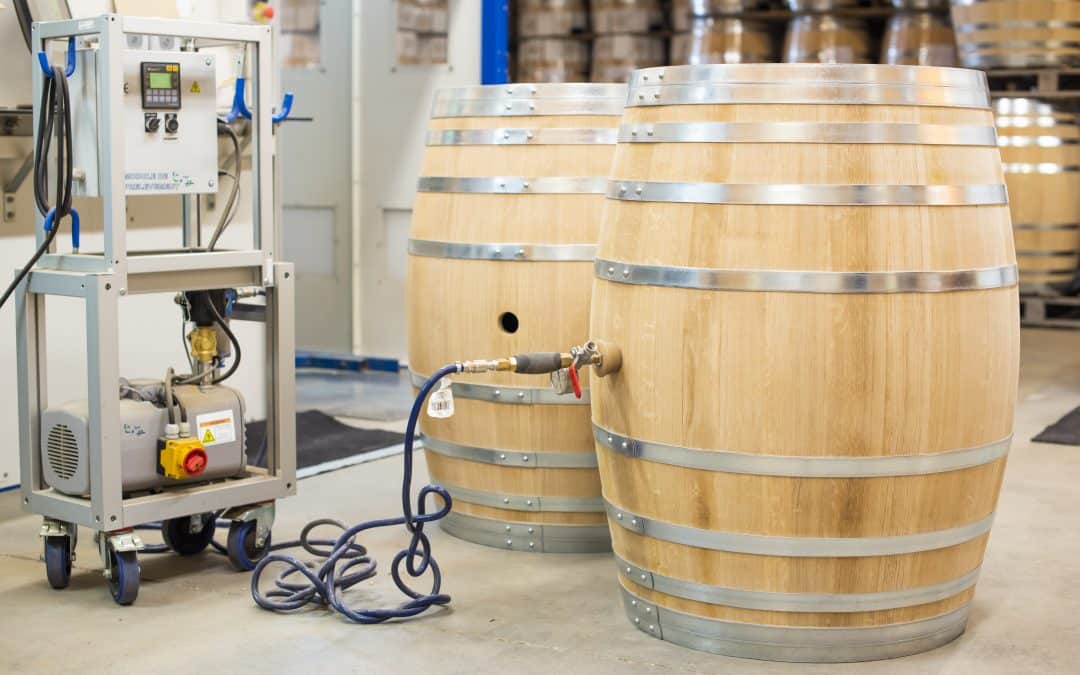Pursuing the tradition of excellence, know-how and innovation that has led barrel production since 1875, meeting the expectations of an ever more demanding wine & spirits sector, Tonnellerie Baron crosses a new threshold by testing and guaranteeing, from January 2021, 100% of its production is free of detectable HA (Haloanisoles) and HP (Halophenols) at the completion of the production process in our workshop – that is, molecules responsible for organoleptic deterioration in wine. An initiative that goes hand in hand with an awareness-raising mission
for all professionals in the sector.
Founded in 1875 near Saintes (Charente-Maritime) by Henri Baron, Tonnellerie Baron has been perpetuating for a century and a half the historic craft of coopering. Taken over in 1996 by the fifth generation, Xavier Baron and Nicolas Tombu, then joined by Lionel Kreff in 2001 and Sebastian Lane in 2009, this independent family business has built its longevity and reputation on a tradition of excellence, elegance, precision and innovation. A philosophy that is more relevant than ever, at a time when the wines & spirits sector is proving ever more demanding in terms of reliability, traceability and the quality of the barrels it will use for its vinification and aging.
THE FIGHT AGAINST “CORK TAINT”
The latest innovation from Tonnellerie Baron comes as a response to an often-neglected issue which can nevertheless pose a serious threat to the final product and to the trust between producers and consumers; the presence of Haloanisole molecules (TeCA, TCA, PCA, TBA), but also their precursors HaloPhenols (TeCP, TCP, PCP, TBP) in barrels. These particular molecules are responsible for the much maligned «cork taint» which compromises the integrity of a wine. Most often attributed to a contaminated cork itself, the molecules can also be transported in cellar environments or manufacturing workshops, by water and cleaning products, and also directly by the source wood used in barrel making.
In fact, it has been shown that TCA and TeCA, the main molecules responsible for “cork taint”, can be found naturally in the form of “spots” a few millimeters in diameter in oak trees. Thus, a micro-trace of TCA on a single stave can contaminate an entire barrel of wine. In the world of great wines, it is a risk that no producer can afford.
A DRASTIC PREVENTION AND ANALYSIS PROCEDURE
To meet the expectations of its customers and provide them with flawless barrels, Tonnellerie Baron has implemented a drastic prevention protocol. Starting in 2005, we began by regularly testing the entire environment of our workshop, vehicles, and the containers transporting our barrels. Then, since 2014, by TCA testing barrels for a handful of customers.
The following year, Tonnellerie Baron began to experiment with another technique, in cooperation with the LEC laboratory based in Cognac; after pressure checking the barrel, sensors were placed inside the barrel. In just two minutes, all the moist air remaining in the barrel was passed over sensors that have the ability to trap HA -HP molecules.
Within 24 hours, the laboratory analysis is returned indicating whether the barrel is healthy or contaminated. In the event of contamination, the barrel is discarded.
Fully operational since 2016, the process has been gradually extended to our entire production (around 15.000 barrels per year for 1.800 customers). From January 1, 2021, Tonnellerie Baron becomes the first cooperage to guarantee that 100% of the barrels are free of any detectable TCA and TCP at the completion of the production process – a service which is now systematically provided free of charge to all our customers.
By implementing and extending this process to our entire barrel production, Tonnellerie Baron guarantees to its customers maximum security in their process; knowing that it provides them with an excellent product, a top-of-the-range, «zero-defect» barrel to accompany and enhance the aging of their great wines. Finally, this measure actively serves to raise awareness within
the entire sector on the need to deploy, throughout the production chain, absolute requirements on quality which prevent organoleptic defaults in the final product.
* detection thresholds are available upon request

